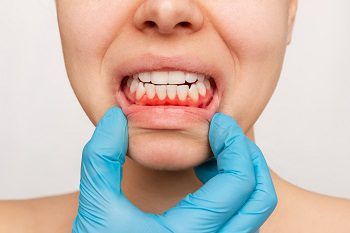What is Periodontitis?
If you've been told that you have periodontitis, you're probably wondering a lot. Periodontitis is a dangerous gum infection that takes a toll on the gum’s soft tissue and, if left untreated, it may result in tooth loss or tooth loosening. Periodontitis is a completely avoidable and very frequent condition. It is often caused by inadequate dental hygiene, and attention to it can even decrease your risk of acquiring it. Read below to understand what periodontitis is and how it can be avoided?
Stages:
This gum disease is often pain-free so it may go unnoticed for a long time. Periodontitis develops in different stages:
Inflammation:
Gingivitis is the first stage, and it is an infection of the gums. When you clean or floss your teeth, you may notice that your gums bleed. This is an early indicator of gingivitis. Teeth discoloration is another thing to watch out for. Bacteria and food debris may build up on your teeth, forming plaque. Even though bacteria are constantly present in your mouth, they are only hazardous when they can multiply rapidly. If you don't brush or floss or have regular dental cleanings, you might end up with an infection.

Early periodontal disease:
A receding gum line causes tiny pockets to grow between teeth and gums in the early stages of periodontitis. The bags are a breeding ground for infections. Your gums recede as your body attempts to fight off the illness. You will experience bleeding and even some bone loss while brushing and flossing.
Moderate periodontal disease:
If moderate periodontal disease is allowed to progress, you may experience bleeding and distress around the teeth and gum recession. You will experience teeth loosening up and weakened bone support. Additionally, the infection may trigger an inflammatory response throughout your body.
Advanced periodontal disease:
The connective tissue that supports your teeth in place starts to degenerate in severe illness. Gums, bones, and other supporting tissue are destroyed. If your periodontitis is advanced, you may have significant discomfort while chewing, severe bad breath, and a foul taste in your mouth. You will almost certainly lose your teeth.
How is periodontitis diagnosed?
During a normal dental checkup, your dentist will be able to spot early indications of periodontitis. They can watch your periodontal health over time to ensure it does not deteriorate further. This is why it is essential to see a deist for screening regularly.
Your dentist may use a probe, a very little ruler, to determine the size of any pockets on your gums. This examination is often painless. If your dentist discovers plaque, tartar or both on your teeth, these particles will be removed as part of professional cleaning. Additionally, they may take dental X-rays or send you to a periodontist, a specialist in diagnosing and treating gum disease, for additional testing and treatment.

Risk Factors:
- Inadequate oral health behaviors
- Tobacco smoking or chewing
- Changes in hormone levels, such as those associated with pregnancy or menopause
- Marijuana usage for recreational purposes, such as smoking or vaping
- Obesity
- Inadequate nutrition, especially a shortage of vitamin C
- Genetics
- Dry mouth due to medication
- Immune-suppressive conditions
To Know about Periodontics Contact your Pinole dentist, Dr Hoss Abar, DDS, MSD at Abar Orthodontics.
Resources:
How Do Periodontal Treatments Work?
This media/content or any other on this website does not prescribe, recommend, or prevent any treatment or procedure. Therefore, we highly recommend that you get the advice of a qualified dentist or other medical practitioners regarding your specific dental condition
More To Explore
About Us
We believe that every patient deserves to feel confident about their smile. Years of experience creating beautiful and flawless smiles.
Opening Hours:
Monday - Thursday: 8:00 AM - 5:00 PM
Friday: 8:00 AM - 12:00 PM
Saturday - Sunday: Closed
Abar Orthodontics, Pinole, CA
1500 Tara Hills Drive., Suite 204
Pinole, CA 94564
Abar Orthodontics, San Leandro, CA
145 East 14th street., #100
San Leandro, CA 94577
© 2026Abar Orthodontics | All rights reserved | Powered by:Vigorant, Inc.
